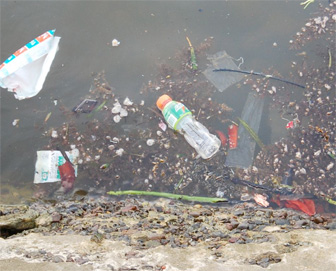The 2010 scientific expedition undertaken by the European program called Mediterranean En-Dangered (MED) reveals that 250 billion microplastics could be found in the Mediterranean Sea. The main goal of the program, which will end in 2013, is to quantify the distribution of plastic pollution and better understand its dynamics in the Mediterranean Sea. Microplastics are usually defined as plastic particles smaller than 5 millimeters, so for most part they are invisible to human eyes.
Samplings were conducted within 20 centimeters depth at 40 sites located in the northwestern basins of the Mediterranean Sea mainly off France and northern Italy. Ninety percent of the samples were composed of microplastics, with some containing up to six times more micro-fragments of plastic compared to plankton, which means that the marine biomass was largely dominated by plastics. In general, micro debris floating on the Mediterranean Sea reached 115,000 particles per square kilometer with a maximum of 892,000 particles. The concentration of plastic debris found in the sea is similar to the one measured in the Atlantic of the Northern Hemisphere or in the ‘Great Pacific Garbage Patch’ which has a huge density of plastic debris. However, these first findings should be extrapolated with cautions to the whole Mediterranean Sea since sampling sites were limited geographically.

|
The amount of plastic that will be manufactured in the next ten years will nearly equal the total produced in the 20th century. Plastic is a major contributor to marine pollution. Impacts of microplastics to organisms and the environment are largely unknown. More than 180 species have been documented to absorb plastic debris including Planktophagous species. For example, laboratory study has shown that krill species Euphasia pacifica ingested 20μm (micrometers) polyethylene fragments. No research has looked at microplastics in deep ocean sediments, and most has only focused on the surface of the ocean. Therefore, the magnitude of the plastic pollution on seas and oceans is poorly understood, but scientific findings like the one by the MED program are very worrisome.
The lack of knowledge on the effects and fate of microplastic marine debris should not stop us from doing everything possible to stop dumping plastics into the Mediterranean Sea, which already faces a barrage of environmental problems. Clearly, considerably reducing microplastic inputs must be a priority of this decade.
For more information from Endangered Species International